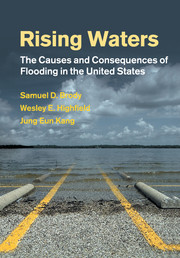Preface
Published online by Cambridge University Press: 28 April 2011
Summary
The information contained within this book was originally based on a National Science Foundation CAREER award to study the relationship between wetland alteration and coastal watershed flooding. Over the past six years, as dozens of colleagues, graduate and undergraduate students, and postdocs participated in the research, the scope of the project broadened to take on a more comprehensive look at flooding, flood impacts, and their policy implications. By bringing together multiple datasets and analyses, we aim to provide the reader with an evidence-based understanding of the degree to which flooding affects people's lives and the opportunities available to mitigate flooding impacts. To that end, we combine concepts, case studies, and statistical models to construct an overall vision of how to mitigate flood problems in the future. We focus our empirical study on Texas and Florida, but hope the findings and lessons learned throughout these pages can inform those based in other places.
While this book is scholarly in nature, it contains information useful to a broad audience, from those working in federal, state, and local government offices, to residents who have experienced flooding in their communities. Readers who do not wish to be overly burdened with understanding statistical procedures and relationships may skip to the summary sections at the end of each chapter, or to the policy recommendations presented at the conclusion of the book.
- Type
- Chapter
- Information
- Rising WatersThe Causes and Consequences of Flooding in the United States, pp. viiPublisher: Cambridge University PressPrint publication year: 2011



